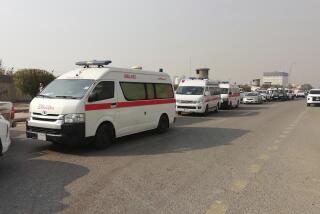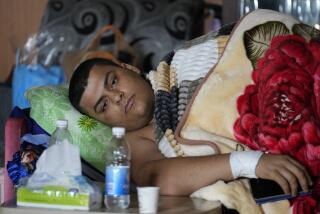Iraqi shoppers lured to their deaths
- Share via
BAGHDAD — The shoppers who filled a strip of grocery stores in Tall Afar could not believe their good fortune when a truck loaded with flour pulled up Tuesday evening and the driver invited them to help themselves.
As they crowded around the vehicle, the driver blew it up, killing at least 50 people and wounding 103 others, officials said.
“They were all innocent civilians,” Mayor Najim Abdullah Jubouri said. “Their only fault is that they are Shiite.”
Across Iraq on Tuesday, at least 84 people were slain or found dead in bombings, mortar attacks, sniper fire and execution-style shootings. In addition, at least three Americans were reported killed, including a soldier and a contractor hit by rocket fire while in Baghdad’s heavily guarded Green Zone.
The Tall Afar attack, which included a nearly simultaneous blast on another street that caused no casualties, was the latest in a series of gruesome strikes by Sunni Arab insurgents seeking to derail what has been called a last-ditch attempt by U.S. and Iraqi forces to end the sectarian war between Sunni and Shiite militants. Many of the deadliest attacks have taken place in cities outside Baghdad as U.S. and Iraqi security forces concentrate on stemming violence in the capital.
Tall Afar is a mainly ethnic Turkmen city divided between Shiite and Sunni Muslims. Insurgents took over the city until U.S. and Iraqi troops drove them out in September 2005. A year ago, President Bush cited the city as an example of progress in Iraq, but it has suffered frequent attacks since then.
More than five hours after the early evening bombings there, rescuers were still pulling bodies from the rubble of flattened homes and shops in the mostly Shiite section of Sheik Juan, said Iraqi Army Brig. Gen. Mohammed Ahmed.
“It was a strong explosion. I think this is the most powerful explosion in Tall Afar,” he said.
Suryia Qadir, a 44-year-old homemaker out shopping for her family’s evening meal, survived because the pushing and shoving prevented her from getting close.
“I remember, there were two men handing out flour,” she said. “It was a mess. Every one wanted to receive their sack before the others.... I was behind, and I was telling myself if it was meant to be to have one, then that’s fine. If not, so be it. And then the horrible explosion happened.”
Hours later, Qadir woke up in the hospital. “I don’t know how many relatives I lost,” she said.
Aqeel Ghazi, an 18-year-old high school student, thought the truck was delivering part of the monthly food ration provided since sanctions were imposed at the end of the 1991 Persian Gulf War. So he rushed home to collect his government coupons.
“As soon I moved, a massive explosion happened, and I felt I was flying,” Ghazi said, writhing in pain on a hospital bed. “I think I was thrown [10 to 13 feet] up in the air.”
It was the second major attack in the northern city in three days. On Saturday, a bomber with explosives strapped to his waist blew himself up outside a shop that sold sweets, killing at least 10 people.
“I think it is time to stop the insane Sunni extremists,” said Hassan Khudur, a 39-year-old Shiite mechanic who was injured in the blast Tuesday. “Such acts make us hate each other, whether we like it or not.”
Sunni Arabs were targeted in bloodshed elsewhere amid mounting friction within the minority Sunni community that once harbored militants from the group Al Qaeda in Iraq. Some clans in the heavily Sunni Al Anbar province, put off by indiscriminate attacks in which many Sunnis have died, have formed an alliance against the hard-line Islamist group, which is made up primarily of foreign fighters.
U.S. and Iraqi officials have sought to exploit the rift by wooing Sunni Arab clans and some insurgent groups into a united front against Al Qaeda in Iraq, outgoing U.S. Ambassador Zalmay Khalilzad told reporters before his departure Monday.
A suicide bomber exploded a pickup truck outside a restaurant frequented by Iraqi police in the Al Anbar city of Ramadi, killing at least 10 people and wounding 25, police said.
Earlier, gunmen armed with AK-47s and rocket-propelled grenades attacked the Baghdad home of Sheik Dhahir Zubaie, a Sunni tribal leader who has joined the alliance against Al Qaeda in Iraq, police said. At least three people were killed in the ensuing firefight, they said.
There were conflicting accounts of the attack. The U.S. military said two car bombs exploded outside the house. Police said Zubaie’s brother, another relative and a bodyguard were killed when the gunmen fired rocket-propelled grenades at their vehicles.
Zubaie’s brother, Harith Dhahir Khamees Dhari, was identified as the commander of the 1920 Revolution Brigade, an insurgent faction believed to have held talks with U.S. and Iraqi officials. The organization posted a statement on the Internet blaming Al Qaeda in Iraq for the assassination.
His brother heads the influential Zubaie tribe. Its members include Salam Zikam Ali Zubaie, one of Iraq’s two deputy prime ministers.
The deputy prime minister was injured in a suicide attack last week that killed nine people at his home in Baghdad.
The Zubaie tribe is divided over whether to cooperate with Iraq’s Shiite-led government, and security officials blamed a member of the deputy premier’s security detail for the attack.
Another influential member of the tribe, hard-line Sunni cleric Harith Dhari of the Muslim Scholars Assn., has publicly criticized the anti-Al Qaeda alliance, known as the Anbar Salvation Council.
The U.S. Embassy and military provided no details about the rocket attack that killed a soldier and a civilian contractor Tuesday. A second soldier and four other contractors were injured in the attack, wire reports said.
The U.S. military also announced the death of a Marine in combat in Al Anbar province. At least 3,243 U.S. personnel have been killed since the U.S.-led invasion in 2003, according to the website icasualties.org, which tracks military deaths.
In other violence Tuesday, mortar rounds crashed into a Shiite enclave in south Baghdad’s predominantly Sunni Dora neighborhood, killing at least three civilians, police said.
A policeman was killed and another wounded by sniper fire in central Baghdad, police said.
A group of day laborers who work at a major wholesale market in downtown Baghdad came under fire while boarding minibuses to go home, police said. Two were killed and seven wounded, police and hospital officials said.
Police recovered at least 15 unidentified bodies in Baghdad, apparent shooting victims of sectarian death squads.
About 120 Baghdad police cadets were hospitalized with severe food poisoning after sharing a meal on the eve of their graduation, police and hospital officials said. Police were investigating the cause of the incident.
North of Baghdad, two women were killed when gunmen raided their homes in Kirkuk, police said. In addition, a policeman was killed in a roadside bombing in the city.
*
Times staff writers Said Rifai and Saif Hameed in Baghdad and special correspondents in Baghdad, Mosul and Kirkuk contributed to this report.
More to Read
Sign up for Essential California
The most important California stories and recommendations in your inbox every morning.
You may occasionally receive promotional content from the Los Angeles Times.










